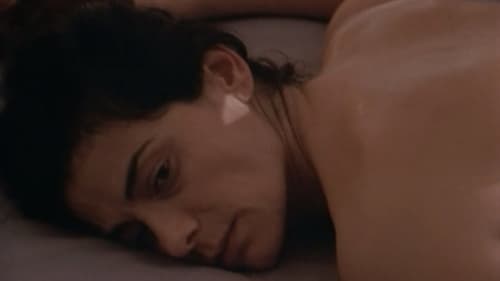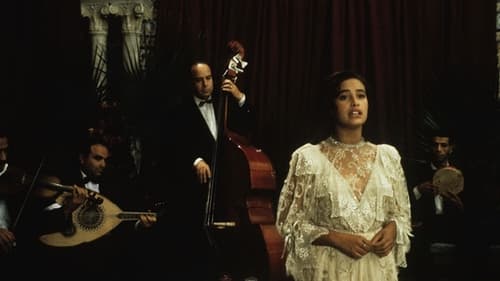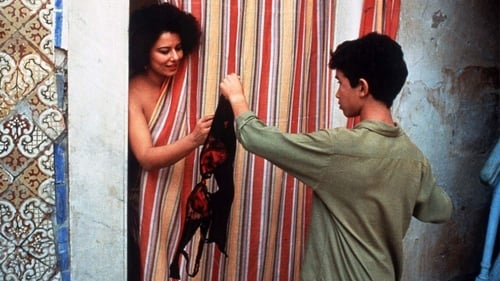Moufida Tlatli
Nacimiento : 1947-08-04, Sidi Bou Saïd, Tunisia
Muerte : 2021-02-07
Historia
Moufida Tlatli was a Tunisian film director, screenwriter and editor. She is noted for her breakthrough film The Silences of the Palace in 1994, which won several international awards. She went on to direct two more films: The Season of Men and Nadia and Sarra.

Writer
Nadia is a 45 year old female professor at the University of Tunis. She is married and has a daughter of 18, Sarra. For some time, Nadia has problems in her marriage also symptoms of menopause are inseparable. The physical and psychological state deteriorates inexorably Nadia.

Director
Nadia is a 45 year old female professor at the University of Tunis. She is married and has a daughter of 18, Sarra. For some time, Nadia has problems in her marriage also symptoms of menopause are inseparable. The physical and psychological state deteriorates inexorably Nadia.

Writer
An 18 year old on the island Djerba, Aicha, is married to Said, who works in Tunis for much of the year. Aicha breaks with tradition and decides to join Said in Tunis, weaving rugs to make money. Said asks that she give him a son, so Aicha lives under the rule of her mother-in-law.

Director
An 18 year old on the island Djerba, Aicha, is married to Said, who works in Tunis for much of the year. Aicha breaks with tradition and decides to join Said in Tunis, weaving rugs to make money. Said asks that she give him a son, so Aicha lives under the rule of her mother-in-law.

Self
The film consists largely of a series of interviews with female filmmakers from several different countries and filmmaking eras. Some, such as Agnès Varda and Catherine Breillat (both from France), have been making films for decades in a conscious effort to provide an alternative to the male filmmaking model; others, such as Moufida Tlatli (Tunisia) and Carine Adler (England), are relative newcomers to directing, and their approaches seem more personal and less political. The film as a whole manages to cover some important topics in the feminist debate about film -- how does one construct a female gaze, how can one film nude bodies without objectifying the actors (of either sex), what constitutes a strong female role -- while also making it clear that “women’s film” comprises as many different approaches to filmmaking as there are female filmmakers.

Editor
The death of a prince brings a young woman back to the palace where she was born into servitude. The lingering legacy is brought into light from behind frosted windows and velvet curtains.

Writer
The death of a prince brings a young woman back to the palace where she was born into servitude. The lingering legacy is brought into light from behind frosted windows and velvet curtains.

Director
The death of a prince brings a young woman back to the palace where she was born into servitude. The lingering legacy is brought into light from behind frosted windows and velvet curtains.

Editor
Retrato de la alegre, sensual y mediterránea sociedad tunecina a través de los ojos adolescentes de Noura, de 12 años. (FILMAFFINITY)

Editor
Two Palestinian lovers, parted during the 60s when he is imprisoned for resisting the Israeli occupation and she sorrowfully emigrates to the US, come together again in Jerusalem some 18 years later. He works for an agricultural aid organization, she is a scholar researching the meaning of sacrifice in Palestinian society. Around them rages the turmoil of the first Intifada.

Editor

Editor
In this Sufi tale, Nadia, a young Moroccan emigre returns from Paris to Fez to visit her dying father. At his funeral, she is overcome by the voice of Karina chanting the Koran. A powerful friendship develops between the two women as they decide to turn the father's palace into a shelter for Muslim women.

Editor
A determined young woman in a remote Tunisian city bucks tradition by studying for an academic degree, instead of accepting the time-honored, submissive role of her sex as a wife and housekeeper for some 'mustached man'.

Editor
Focusing on key Arab films produced in the last 20 years. Férid Boughedir traces the development of the film-makers' concern to produce more socially aware cinema. Themes include the issue of Palestinian homeland rights and the nature of Arab identity. The film-makers also share a desire to develop a strong poetic tradition.

Editor
The first of Nacer Khemir's highly-regarded Desert Trilogy that includes The Dove's Lost Necklace and Bab'Aziz - The Prince Who Contemplated His Soul. Khemir creates an exotic world with Wanderers of the Desert when a young teacher arrives to take over a village school isolated in the shimmering desert. Legendary figures materialize out of wells and the desert itself, groups of children hurry through a labyrinth of underground corridors, the teacher is whisked away to a mysterious rendezvous and never returns.

Editor
Mahmoud Ben Mahmoud's first feature film.

Editor
Rich in environmental mood and ethnic color, this human drama chronicles the lives and rituals of a nomadic Berber tribe in the southern Tunisian desert, especially focusing on a son about to inherit the full mantle of leadership. When he sees that their sheep are threatened with a possibly devastating illness, the precarious nature of the group's existence is brought home to him and he leaves to gain a livelihood and knowledge in the city. Once he gets back, bringing money and presents, it first appears that the group will be assured of a better future because of his enterprising outreach. Yet military and governmental officials arrive on the scene to take a census and the young man is conscripted, against his will.

Editor
The first full length film to be shot within the disputed Palestinian West Bank "Green Line," FERTILE MEMORY is the feature debut of Michel Khleifi, acclaimed director of the Cannes Film Festival triumph, WEDDING IN GALILEE. Lyrically blending both documentary and narrative elements, Khleifi skillfully and lovingly crafts a portrait of two Palestinian women whose individual struggles both define and transcend the politics that have torn apart their homes and their lives.

Editor
Directed by Abdellatif Ben Ammar.

Editor
Farouk Beloufa's only directorial endeavor follows the life of a group of leftist friends in West Beirut in the early 1970s. Coupled with its exploration of war through photography and cinematography, Nahla is a love story starring the glamorous Yasmine Khlat and featuring a soundtrack composed by Ziad Rahbani.

Editor
A watershed film, Omar Gatlato held a mirror up to Algerian male culture and the mirror cracked. The title refers to the expression "gatlato al-rujula," or, roughly, "machismo killed him" and the film's mordant insights into male posturing and alienation in Algerian society animate this bit of folk wisdom. In mock documentary style, a young man recounts with wry commentary a typical day in his life in the Bab el-Oued quarter of Algiers, while the camera playfully shows a different story. In following Omar and his friends in their pursuit of happiness, the film examines with shrewd humor the gang values of urban youth; their passion for popular culture (soccer, "Hindoo" movies, Rai concerts), their hidden fear of women, and their social insecurity in an environment where they are marginalized.

Editor
A pioneering film from Tunisia, Fatma 75 is the first non-fiction film by a Tunisian woman, a feminist essay film, and the first in a series of powerful films about strong female figures in the country. The film was made in the UN International Women's Year 1975, and has long been recognised as one of the most important films from North Africa, but has never officially been seen before due to censorship.

Editor
Kemal studies in the Sadiki boarding school. Since the death of his father who was murdered by a secret colonial organization, Kemal has doubts about the political situation of Tunisia.









